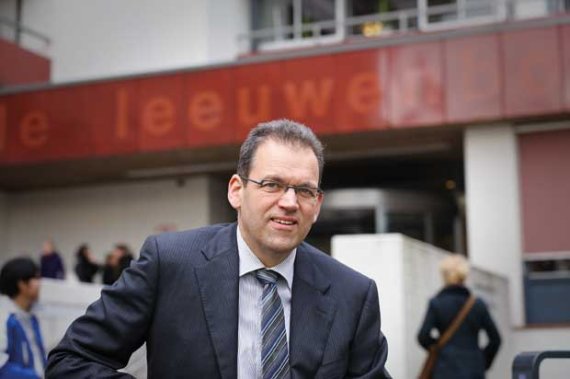His new job is highly relevant, says Huirne, currently still director of the Social Sciences group. He will report directly to Piet Moerland, the big boss at Rabobank Nederland. But the question for him beforehand was: is this the right job for me? ‘I am a business economist, I am interested in the primary sector and in agribusiness, and I like working with a large international organization, somewhere I can go on developing myself. The content of the job suits me. The local branches of the Rabobank make their own decisions on loans to farmers and horticulturalists. Above 5 to 7 million euros, my future department is drawn in to help decide whether the loan is justified. We also help assess tricky and international credit applications. And we carry out sector studies in order to keep the local banks well-informed about the markets.’
That sounds nerve-racking, given the current financial crisis.
‘Up to now, agriculture and horticulture have been seen as relatively safe bets. But you give credit for 20 years and credit is becoming harder to come by, with banks building in more buffers, as well as scrutinizing a company’s risk profile more closely. We’ve had the EHEC bacterium, but we also have to deal with extreme weather and with markets closing their borders because of animal or plant diseases. As a bank you have to weigh up the factors in this broader picture. My subject area as a professor was all about calculating business-economic risks, so that’s a good fit. I do still have to get my banking qualification. When it comes to the crisis, at the moment all I can say is: I read the paper – I know as much about it as you do.’ Counting your student years, you have been at Wageningen UR for 25 years already. You’ve been involved in quite a few disciplines in that time. You have been director of both the Animal Sciences Group and the Social Sciences Group. But you have also led the nutrition researchers. Were there big differences between these fields? ‘Those groups have far more in common that people realize. They are all working on experiments, data collection and statistics, whether it’s for an animal experiment, a nutrition experiment or a social survey. And people’s attitudes are similar too. Their motives are good and they are fascinated by their subject. And everywhere you go, cooperation between groups is tricky. There are always barriers and habitual island mentalities; this is something you often find yourself having to talk to people about. Because cooperation often pays off.’ Examples? ‘Johan van Arendonk saw opportunities to expand breeding research at the university and DLO jointly, through which his group has grown considerably. At the AFSG, Rene Wijffels is a good example with his algae consortium – and there again, you see a collaboration between the university, DLO and companies. It is harder in the social sciences, partly because the LEI has a primarily economic focus, and half of the university groups do not. To me, collaboration and being outward-looking are important, but I have never imposed this on people. Using force doesn’t work; the drive has to come from people themselves, and success comes when people believe in what they are doing.’ The LEI is in financial difficulties now. ‘We saw that coming, because government funding is being reduced. So two years ago we appointed new people to bring in assignments from other parts of the market. They have not all been equally productive. We hope to make a switch, but the big question will be what we attract this year through the top sectors. One quarter of the LEI budget, which previously came from the ministry of EL&I, now has to come from the innovation contracts. Topic such as the economy, the market and competitiveness are mentioned in many of the contracts, but only at the end of March will we know whether this will be put into action. The ministry is going to have to make choices. I hope that they don’t put all the emphasis on technology.’ Huirne will not be gone completely from 1 February. He will continue to work on the Russia project as extraordinary professor. Does that have anything to do with his Russian wife? ‘No, I have been travelling to Russia since 1995; it’s more that she is a result of that. We are providing agricultural knowledge in order to help raise the productivity and quality of Russian agriculture. That network in Russia very much depends on me personally, and it is too early to hand it over. Besides, the Rabobank is very interested in it too.’

